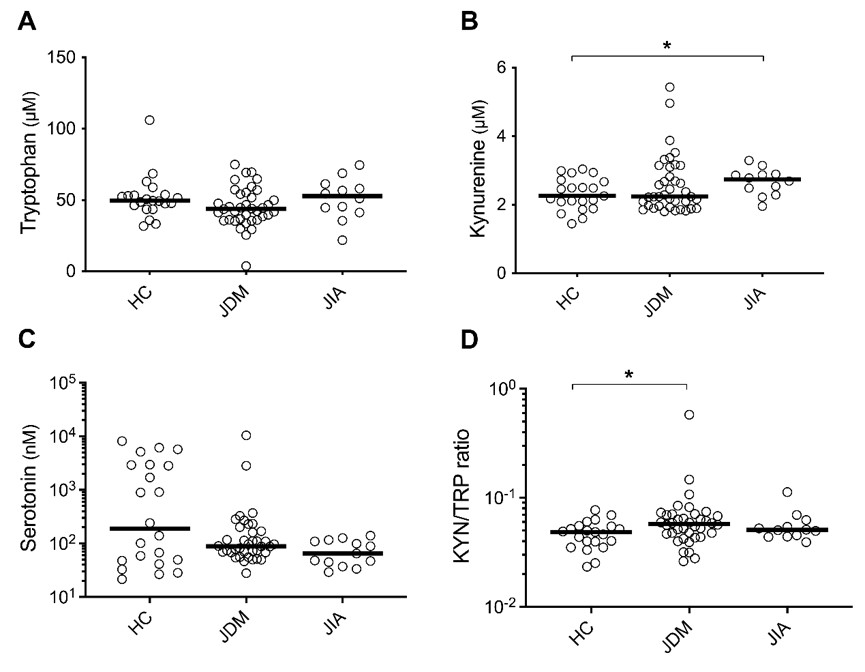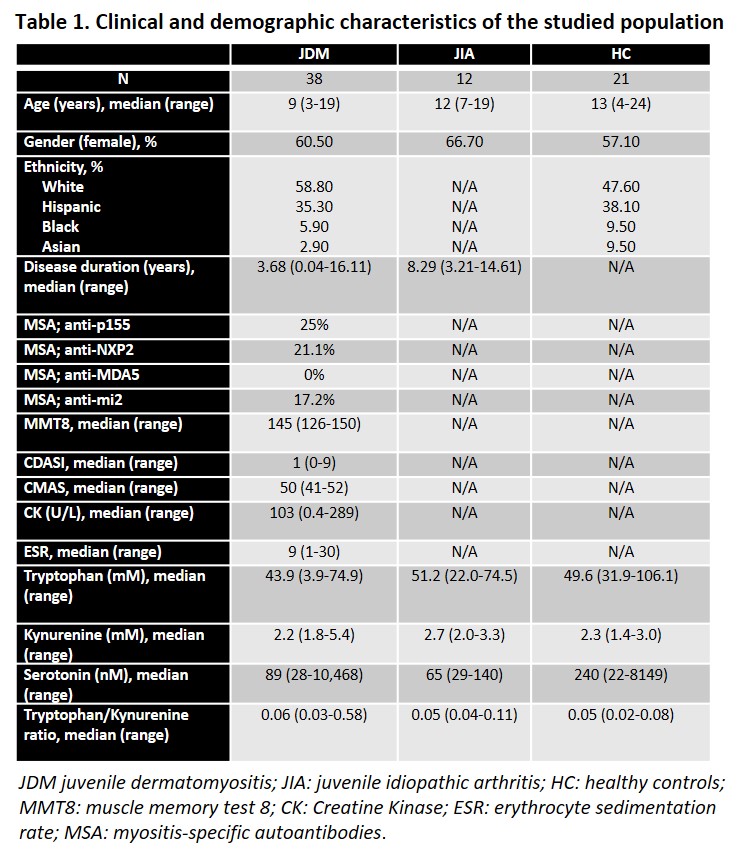Session Information
Session Type: Poster Session B
Session Time: 10:30AM-12:30PM
Background/Purpose: Children with juvenile dermatomyositis (JDM) and juvenile idiopathic arthritis (JIA) experience impaired quality of life and high rates of anxiety and depression. The underlying pathogenesis remains unknown and is likely multifactorial. Type I interferons skew tryptophan metabolism through up-regulation of Indoleamine 2,3-dioxygenase (IDO), limiting availability of serotonin, while promoting neurotoxic kynurenine metabolites, as seen in lupus. This exploratory pilot study investigated the role of tryptophan metabolism in JDM pathogenesis, comparing them to JIA and healthy controls (HC) with a focus on mental health burden.
Methods: Plasma from JDM (n=38) and JIA (n=12), as well as HC (n=21) were analyzed for tryptophan, kynurenine, and serotonin levels using ELISA. IDO activity was indirectly assessed by calculating the kynurenine/tryptophan ratio. Anxiety (Pediatric Symptom Checklist-17 (PSC-17)) and depression (Patient Health Questionnaire 9 (PHQ-9)) screens were obtained at the time of biomarker sample collection. Statistical analyses were performed using the Mann-Whitney U test and Spearman’s correlation.
Results: For patient characteristics, see Table 1. Whereas tryptophan levels were similar across the cohorts, kynurenine levels were elevated in JIA (p< 0.05) (Fig 1B), with serotonin level being lower in JDM and JIA though not reaching statistical significance (Fig 1C). The kynurenine/tryptophan ratio was elevated in JDM patients compared to HC (p< 0.05) (Fig 1D). For JDM, the kynurenine/tryptophan ratio positively correlated with Creatine Kinase (CK) (r=0.46, p=0.01) (Fig 2A). Further, unexpectedly, kynurenine levels negatively correlated with the PSC-17 total score (r=-0.61, p=0.04) (Fig 2B), indicating higher kynurenine levels were associated with fewer reported symptoms. Additionally, serotonin levels were inversely related to the PHQ-9scores, though not reaching statistical significance (r=-0.55, p=0.08) (Fig 2C), suggesting lower serotonin levels were linked to higher depression scores.
Conclusion: Our study reveals, for the first time, an altered tryptophan metabolism in JDM patients, with an increased kynurenine/tryptophan ratio correlating with muscle damage and mental well-being. These findings suggest that altered tryptophan metabolism may play a role in the disease mechanisms and psychological health of affected children and further studies are warranted.
Plasma levels of (A) tryptophan, (B) kynurenine, (C) serotonin, and (D) the kynurenine/tryptophan ratio in healthy controls (HC), juvenile dermatomyositis (JDM), and juvenile idiopathic arthritis (JIA) patients. The Mann-Whitney U test was utilized for statistical analysis.
Correlations between A) kynurenine/tryptophan ratio and creatine kinase (CK), B) kynurenine levels and Pediatric Symptom Checklist_17 (PSC_17) total score, and C) serotonin levels and Patient Health Questionnaire 9 (PHQ-9) depression score in patients with JDM using Spearman’s correlation coefficient.
To cite this abstract in AMA style:
Wu Y, Lanis A, Gonzalez-Chapa J, Shi J, wang q, Li M, Zeng X, Shenoi S, Lood C. Altered Tryptophan Metabolism in Juvenile Dermatomyositis Is Associated with Muscle Damage and Mental Health [abstract]. Arthritis Rheumatol. 2024; 76 (suppl 9). https://acrabstracts.org/abstract/altered-tryptophan-metabolism-in-juvenile-dermatomyositis-is-associated-with-muscle-damage-and-mental-health/. Accessed .« Back to ACR Convergence 2024
ACR Meeting Abstracts - https://acrabstracts.org/abstract/altered-tryptophan-metabolism-in-juvenile-dermatomyositis-is-associated-with-muscle-damage-and-mental-health/



